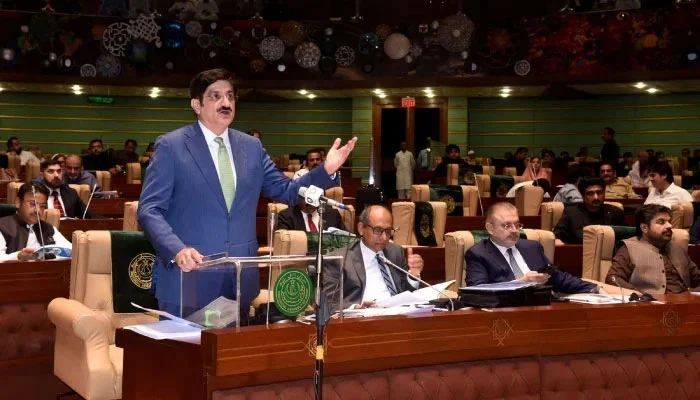Sindh unveils Rs3.45 trillion budget focused on tax relief, development, and social reform
In a key legislative session on Wednesday, the Sindh Assembly approved a Rs3.45 trillion provincial budget for the fiscal year 2025–26, marking a significant 12.9% increase from the previous fiscal cycle. The finance bill was presented by Chief Minister Syed Murad Ali Shah, who also serves as Sindh’s finance minister.
Despite strong opposition, including the submission of more than 2,000 cut motions, the treasury benches held firm, passing the budget without amendments.
The chief minister stated that the new budget places people at the center of policy-making, aiming to expand infrastructure investment, protect vulnerable groups, and stimulate economic growth.
A major highlight of the budget is the withdrawal of six levies, including the professional tax, offering Rs5 billion in financial relief to salaried individuals and small enterprises. The entertainment duty has been removed to foster cultural activities, and land documentation fees have been halved. In another move to support business and transport, the commercial vehicle tax is now capped at Rs1,000 per year.
The development budget accounts for Rs1,018.3 billion, while Rs281.7 billion has been set aside for capital projects. The government has committed Rs43 billion toward an Ad-hoc relief allowance and Rs16 billion for a 15% increase in pensions.
Education remains a priority: Rs42.2 billion will go to public universities, and Rs10.4 billion has been allocated for medical education. In a further bid to simplify insurance obligations, stamp duty for third-party vehicle insurance is fixed at Rs50, while motorcycles are fully exempted.
Under the Annual Development Programme, Rs8 billion will support the Benazir Hari Card, Rs2 billion has been dedicated to low-income housing, and Rs25 billion is earmarked for renewable energy investments.
Modern reforms also feature prominently in the plan. The government will roll out blockchain-based digitisation of land records and a one-step land ownership transfer system. Other initiatives include a mobile birth registration system and enhanced credit availability for farmers through the Sindh Cooperative Bank.
Chief Minister Murad Ali Shah described the overall approach as one of fiscal responsibility paired with citizen-focused reform, aiming to promote long-term development and institutional transparency.



